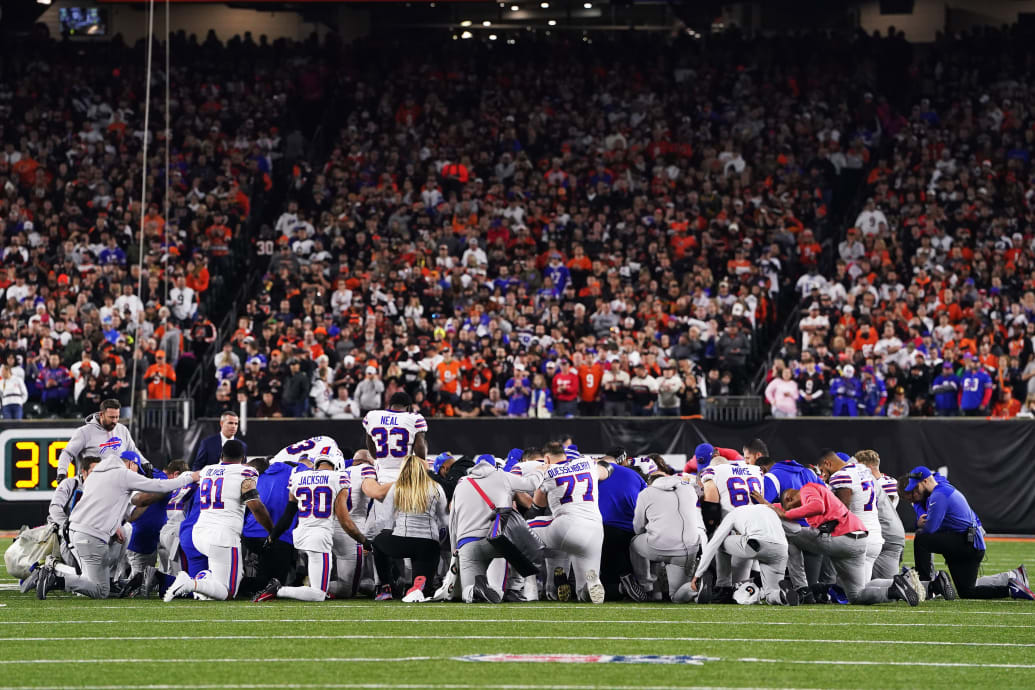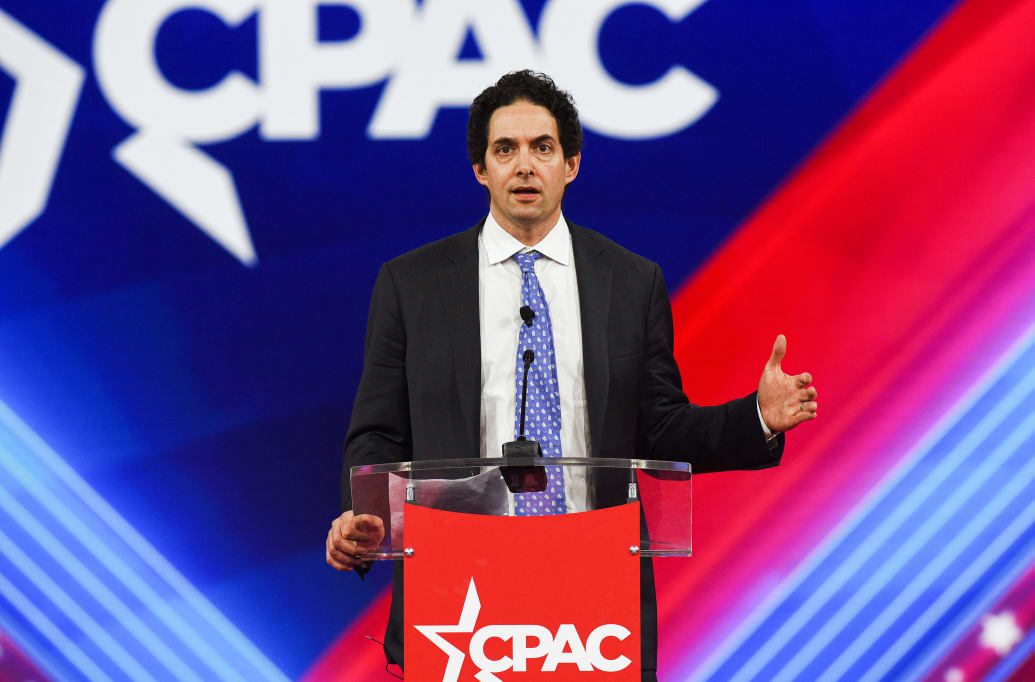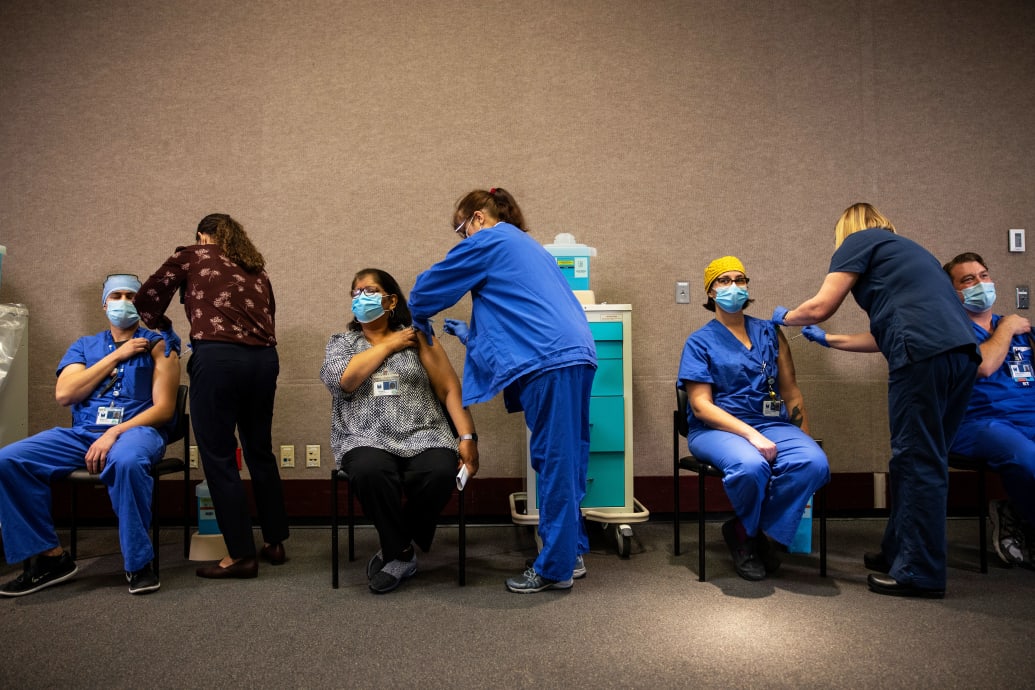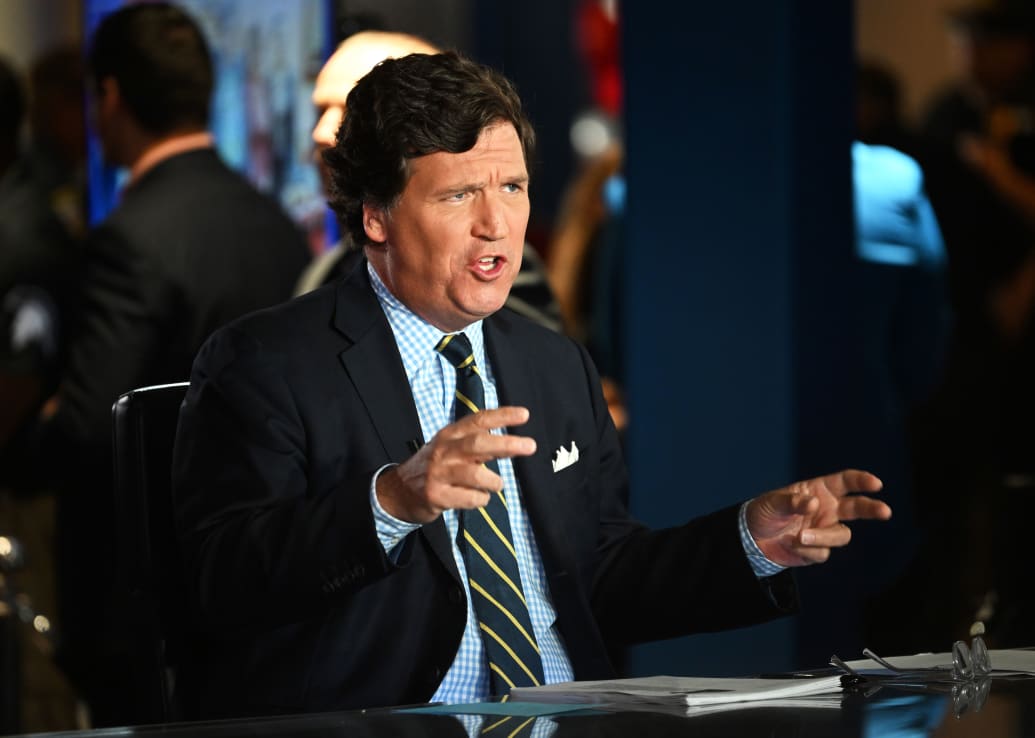Why Anti-Vaxxers Pounced on Damar Hamlin’s Collapse
Buffalo Bills safety Damar Hamlin suffered cardiac arrest and collapsed after making a tackle during a Monday Night Football game versus the Cincinnati Bengals. While most saw a tragedy, anti-vaxxers saw opportunity.
As of this writing, the reason Hamlin’s heart stopped remains unknown—one possibility raised by cardiologists is an arrhythmia caused by blunt impact to the chest—but that didn’t stop conspiracy theorists from baselessly claiming it was a COVID-19 vaccine.
Whether Hamlin has taken the vaccine or any boosters, and (if so) how many doses he’s had, isn’t publicly known either. He was in the league last season, when the NFL said “nearly 95 percent of players are vaccinated,” so it’s likely he’s had at least one COVID shot, but even if that’s the case, we have no idea if he’s had any since, and most of the already rare heart issues that arose after vaccination have occurred within seven days of getting one.
Nevertheless, some MAGA influencers, such as YouTuber Tim Pool and former Navy officer Andrew Rose, used the incident to declare that public health officials’ were lying when they said approved COVID vaccines are “safe and effective.”
Celebrity doctors who have spread doubts about COVID shots got in on the action too. Drew Pinksy, the former host of VH1’s Celebrity Rehab with Dr. Drew, tweeted “Another athlete who dropped suddenly” to his 2.6 million followers, implying the number of athlete collapses spiked in the last two years (it hasn’t), and that medical examination has indicated the not-actually-real spike was caused by vaccines.
However, sudden cardiac arrest in young athletes has been a medical concern for years—see, for example, these peer-reviewed papers from 2016 and 2001—and there’s no evidence indicating that a vaccine first administered in December 2020 is a significant cause of it. Some anti-vaxxers point to VAERS, a public comment system run by America’s Centers for Disease Control (CDC) and Food and Drug Administration (FDA). But since it allows anyone to say anything, medical professionals consider the data basically worthless, and the CDC emphasizes that VAERS reports do not show causality.
Aseem Malhotra, a U.K. doctor whose writing on coronary artery disease the British Heart Foundation called “misleading and wrong,” reacted to news of Hamlin’s collapse by repeating his claim that COVID vaccines should be considered “a likely contributory factor in all unexpected cardiac arrests… until proven otherwise.”

Buffalo Bills players huddle and pray after teammate Damar Hamlin #3 collapsed on the field after making a tackle against the Cincinnati Bengals during the first quarter at Paycor Stadium on January 02, 2023 in Cincinnati, Ohio.
Dylan Buell/Getty Images
That’s not how science works. Evidence showing that X is a significant cause of Y is necessary before scientists think it’s a likely factor. Presuming otherwise violates a scientific principle so well known it’s become a cliche: correlation is not causation. Just because two things happened around the same time doesn’t mean one caused the other.
And with Damar Hamlin’s cardiac arrest, we don’t even know if there’s correlation.
Science vs. Conspiracy Theory
Scientific analysis requires a baseline of skepticism, where the burden of proof falls on those making a causal claim. That doesn’t mean one should assume a theory is definitely false, just that it shouldn’t be considered likely until tested and supported by evidence.
To test a theory, scientists need data; a universe of cases, a representative sample, not merely a few anecdotes that fit a preconceived conclusion. Otherwise a correlation between X and Y could be coincidence, or X and Y could both be caused by some factor Z. Telling people to assume, without evidence, that X caused Y until someone else proves that it doesn’t is the method of superstition, manipulation, and conspiracy theories.
Conspiracy theorists typically go further, not just insisting an unsupported theory is true, but continuing to insist it’s true in the face of evidence that it’s not. COVID vaccine conspiracy theories are an especially egregious example.
Over 13 billion doses of COVID-19 vaccine have been administered worldwide. About 80 percent of the population in both the United States and United Kingdom have had at least one COVID shot. It’s effectively the biggest scientific test of a vaccination program in history, and antivax theories of widespread negative effects have decisively failed.
If anti-vaxxers were right, there would be millions of vaccine-caused deaths and millions more hospitalizations. It should be like COVID itself, where just about every hospital in the U.S., U.K., and other countries has treated numerous patients, and most individuals know someone who died, or at least got seriously ill.
But that hasn’t materialized. As with any medical procedure, there are some instances of complications, but they’ve been rare, nowhere near the scale anti-vaxxers presume. And yet, rather than breathe an epic sigh of relief that their fears were unwarranted, they’ve plowed ahead, pretending it actually happened.
“Telling people to assume, without evidence, that X caused Y until someone else proves that it doesn’t is the method of superstition, manipulation, and conspiracy theories.”
They do this even at the anecdotal level.
Before pointing to Damar Hamlin’s cardiac arrest as evidence of his antivax theories, Aseem Malhotra made similar claims about Foo Fighters’ drummer Taylor Hawkins, who died last year at the age of 50. Hawkins “suffered a sudden cardiac death because of the mRNA jab he’d recently taken under coercion,” Malhotra blared, prompting criticism from the late drummer’s family and bandmates. A toxicology report found ten substances in Hawkins’ system, including opiates, antidepressants, and benzodiazepines, indicating his death was likely caused by an overdose.
“Just Asking Questions”
Lack of evidence doesn’t pose a problem for conspiracy theorists, because they can always incorporate the absence into their theories.
If the public doesn’t see proof, that must be because everyone in a position to observe or publicize the evidence is in on the conspiracy. It doesn’t make sense if you really think about it—do you realize how many people need to have superhuman competence to pull off something that big without leaving tons of evidence?
But conspiracy theorists know some people won’t. One allure of conspiracy theorist communities is the shared feeling that they’re smarter than others, that they’ve figured out a secret most can’t see, or that the reason they’re unhappy with something in their life isn’t some combination of bad luck and their own bad decisions, but due to people they don’t like working to keep them down.
Whether deliberate or not, pushing conspiracy theories is effectively con artistry, exploiting the gullible with claims that boil down to “just trust me.”
Malhotra, for example, said a “reliable source” backed up his claims about Taylor Hawkins, but the source was “afraid of speaking out for fear of losing his job.” If this supposed source never comes forward, others can’t evaluate his reliability or scientifically examine his evidence. How convenient.
Part of the trick is to cast conspiracy theorists and people who believe them as victims of shadowy forces. The source wants to show you the proof, but can’t, because his employers are in on it. The government and mainstream media “knows” the conspiracy is real, but they prevent you from finding out by punishing anyone who merely asks about it.

Former New York Times reporter and COVID-19 vaccine critic Alex Berenson addresses attendees on day one of Orlando’s 2022 Conservative Political Action Conference (CPAC).
Paul Hennessy/SOPA Images/LightRocket via Getty Images
Alex Berenson—memorably dubbed by Atlantic writer Derek Thompson as “the pandemic’s wrongest man” for how many debunked claims he aggressively pushed—denounced reports of doctors suggesting non-vaccine causes for Damar Hamlin’s cardiac arrest as “spin.” The “media and league will do whatever they can to avoid the obvious question,” Berenson insinuated. But in reality, the NFL and various media figures are asking obvious questions such as “what happened?”, “will he be okay?”, and in sports media, “when will the postponed game resume?”
If a reporter asks a doctor about it, they don’t have access to Hamlin’s medical records—including his vaccination status—and offer possible explanations consistent with the scientific literature, usually with careful caveats. As for the doctors treating Hamlin, reporters and talking heads don’t know what specifics they’re asking, and Berenson doesn’t either.
Charlie Kirk, who runs Turning Point USA (TPUSA), one of the most influential Republican organizations in the United States, also claimed to be a victim for asking questions.
After Hamlin collapsed, Kirk tweeted to his 1.9 million followers a sentiment similar to Dr. Drew’s: “Athletes dropping suddenly.” Kirk called that an “all too familiar sight right now,” as if it was a recent phenomenon. Seventeen hours later, Kirk announced that, “For committing the crime of noticing that athletes are tragically collapsing on the playing field, I have been labeled ‘human garbage’… Paying attention yet?”
There’s no evidence vaccines played a role in Damar Hamlin’s cardiac arrest, but there is evidence someone harshly criticized Charlie Kirk. And the harsh criticism couldn’t possibly be because just about every public figure gets harsh criticism on social media, and some people think Kirk is wrongly spreading misinformation that undermines individual and public health. No, it must indicate he’s right and “not allowed” to say the things he’s saying in public without any consequence besides harshly critical speech.

Healthcare workers get the Pfizer-BioNTech COVID-19 vaccination at the Legacy Emanuel Medical Center on December 16, 2020 in Portland, Oregon.
Paula Bronstein/Getty Images
Early in 2022, Sen. Ron Johnson (R-WI) did something similar in an appearance on Kirk’s radio show, making the wildly inaccurate claim that “over 22,000 deaths” have been associated with COVID vaccines, and lamenting how there’s “all these athletes dropping dead on the field, but we’re supposed to ignore that.” When pressed, Johnson spokesperson Alexa Henning defended the senator by saying he was just asking questions, not making factual claims. For evidence that Johnson’s concerns had merit, she linked to an anonymous blog post. Upon further examination by Washington Post reporter Glenn Kessler, the claims in that blog post could be traced back to an Austrian website associated with the country’s far-right Freedom Party.
That’s one way that fringe ideas become mainstream.
Politics and Antivax
The problem with “just asking questions” is not that people are asking, it’s that the questions they’re asking have answers they refuse to acknowledge.
Anyone actually interested in the risks of various vaccines can look at data from clinical trials and real-world usage, consult peer-reviewed papers and public health officials, or just ask their doctor, almost all of whom recommend vaccination against COVID-19 and other diseases. Anyone who wants to know what caused Damar Hamlin’s collapse will wait to hear from the medical professionals who are caring for him.
Anti-vaxxers, however, are interested in giving people the false impression that the answer is vaccines, so they pretend no one will answer the questions, and that someone somewhere is stopping people from asking them.
It’s not a coincidence that some of the most prominent figures “just asking questions” about COVID vaccines, such as Sen. Ron Johnson, Charlie Kirk, Fox News host Tucker Carlson, and Daily Wire pundit Candace Owens, also push political conspiracy theories. “Just asking questions”—whether about immigration, the 2020 election, or COVID vaccines—isn’t pursuit of facts, it’s rejection of them in favor of insinuation and grievance.

Tucker Carlson speaks during 2022 FOX Nation Patriot Awards at Hard Rock Live at Seminole Hard Rock Hotel & Casino Hollywood on November 17, 2022 in Hollywood, Florida.
Jason Koerner/Getty Images
If you can get people to reject authoritative sources of information, from professional medical associations to election administrators, you can get them to believe just about anything. It traps them in information bubbles where “everyone knows” that powerful forces are conspiring against them, they can’t trust anyone else, and have no choice but to fight back.
But factual reality is a constant threat to puncture the bubble, so conspiracy theorists exploit the human tendency to treat anecdotes on par with data to take things in the news, such as a football player’s tragic collapse on live TV—or the deaths of celebrities such as actress Betty White, rapper Coolio, or comedian Bob Saget—and claim they validate the theories, even if they don’t.
This article has been archived for your research. The original version from The Daily Beast can be found here.


